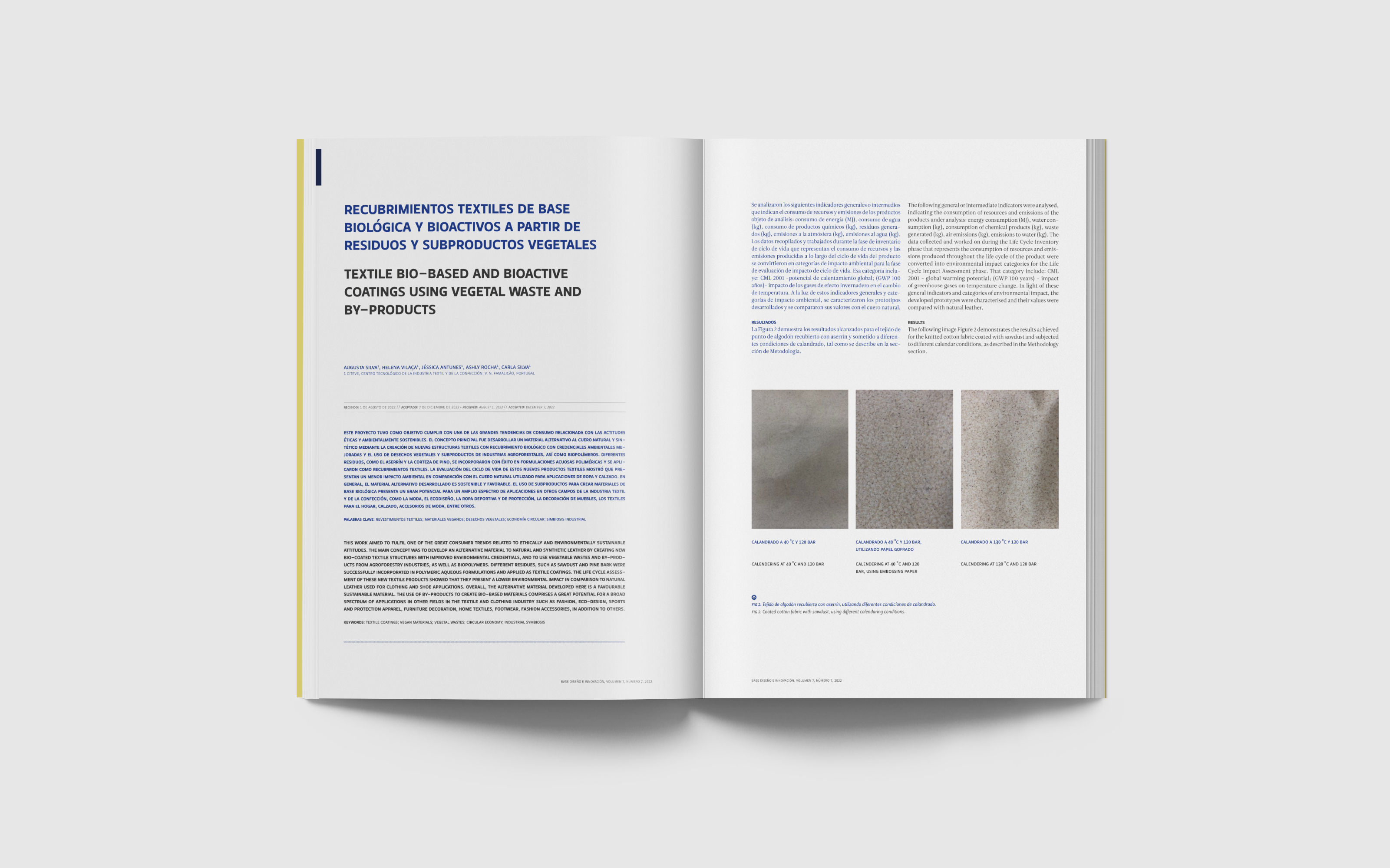Textile bio-based and bioactive coatings using vegetal waste and by-products
Main Article Content
Abstract
This work aimed to fulfil one of the great consumer trends related to ethically and environmentally sustainable attitudes. The main concept was to develop an alternative material to natural and synthetic leather by creating new bio-coated textile structures with improved environmental credentials, and to use vegetable wastes and by-products from agroforestry industries, as well as biopolymers. Different residues, such as sawdust and pine bark were successfully incorporated in polymeric aqueous formulations and applied as textile coatings. The Life Cycle Assessment of these new textile products showed that they present a lower environmental impact in comparison to natural leather used for clothing and shoe applications. Overall, the alternative material developed here is a favourable sustainable material. The use of by-products to create bio-based materials comprises a great potential for a broad spectrum of applications in other fields in the Textile and Clothing Industry such as fashion, eco-design, sports and protection apparel, furniture decoration, home textiles, footwear, fashion accessories, in addition to others.
Article Details
References
Ahmad Khorairi, A. N. S., Sofian-Seng, N. S., Othaman, R., Abdul Rahman, H., Mohd Razali, N. S., Lim, S. J., & Wan Mustapha, W. A. (2021). A review on agro-industrial waste as cellulose and nanocellulose source and their potentials in food applications. Food Reviews International, 1-26. https://doi.org/10.1080/87559129.2021.1926478
Coelho, L., Magalhães, A. I., Fernandes, S., Batista, P., Pintado, M., Faria, P., ... & Malgueiro, R. (2020). Innovation of Textiles through Natural By-Products and Wastes. In A. Körlü (Ed.), Waste in Textile and Leather Sectors. IntechOpen. https://doi.org/10.5772/intechopen.90014
Gaur, V. K., Sharma, P., Sirohi, R., Varjani, S., Taherzadeh, M. J., Chang, J. S., ... & Kim, S. H. (2022). Production of biosurfactants from agro-industrial waste and waste cooking oil in a circular bioeconomy: An overview. Bioresource technology, 343, 126059. https://doi.org/10.1016/j.biortech.2021.126059
Mahari, W. A. W., Waiho, K., Fazhan, H., Necibi, M. C., Hafsa, J., Mrid, R. B., ... & Sillanpää, M. (2021). Progress in valorisation of agriculture, aquaculture and shellfish biomass into biochemicals and biomaterials towards sustainable bioeconomy. Chemosphere, 133036. https://doi.org/10.1016/j.chemosphere.2021.133036
Mallakpour, S., Sirous, F., & Hussain, C. M. (2021). Sawdust, a versatile, inexpensive, readily available bio-waste: From mother earth to valuable materials for sustainable remediation technologies. Advances in Colloid and Interface Science, 295, 102492. https://doi.org/10.1016/j.cis.2021.102492
Meyer, M., Dietrich, S., Schulz, H., & Mondschein, A. (2021). Comparison of the technical performance of leather, artificial leather, and trendy alternatives. Coatings, 11(2), 226. https://doi.org/10.3390/coatings11020226
CML 2001 (n.d.). Description of the CML 2001 Method. Sphera https://gabi.sphera.com/international/support/gabi/gabi-lcia-documentation/cml-2001/
Thorenz, A., Wietschel, L., Stindt, D., & Tuma, A. (2018). Assessment of agroforestry residue potentials for the bioeconomy in the European Union. Journal of Cleaner Production, 176, 348-359. https://doi.org/10.1016/j.jclepro.2017.12.143
Zhang, C., Xue, J., Yang, X., Ke, Y., Ou, R., Wang, Y., Madbouly, S. A., & Wang, Q. (2022). From plant phenols to novel bio-based polymers. Progress in Polymer Science, 125, 101473. https://doi.org/10.1016/j.progpolymsci.2021.101473
Zhou, Q., Le, Q. V., Meng, L., Yang, H., Gu, H., Yang, Y., ... & Peng, W. (2022). Environmental perspectives of textile waste, environmental pollution and recycling. Environmental Technology Reviews, 11(1), 62-71. https://doi.org/10.1080/21622515.2021.2017000


